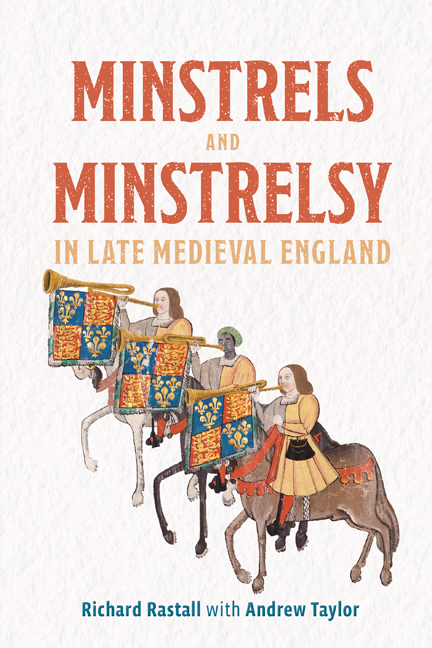Book contents
- Frontmatter
- Dedication
- Contents
- List of illustrations
- List of music examples
- List of abbreviations
- A note on references
- A note on money
- A note on dates
- Preface
- Acknowledgments
- Part I Minstrels and Minstrelsy in the Elite Households
- Part II Urban Minstrelsy
- Part III On the Road
- Part IV Minstrel Performance
- Envoi
- Bibliography
- Index
Preface
Published online by Cambridge University Press: 09 January 2024
- Frontmatter
- Dedication
- Contents
- List of illustrations
- List of music examples
- List of abbreviations
- A note on references
- A note on money
- A note on dates
- Preface
- Acknowledgments
- Part I Minstrels and Minstrelsy in the Elite Households
- Part II Urban Minstrelsy
- Part III On the Road
- Part IV Minstrel Performance
- Envoi
- Bibliography
- Index
Summary
The myth, and the minstrel life
Who were the minstrels of medieval England? What did they do to earn a living, and what sort of lives did they lead? What music did they play, and what other sorts of entertainment could they offer? Medieval iconography shows that many instrumentalists lived comfortably as liveried servants of royalty and the aristocracy; records of court proceedings show that some of the lower-class independent minstrels had brushes with the law (and this is in fact the only type of evidence we have for most of them). Clearly, these are the two extremes of a wide range of social situations in which minstrels lived, and the picture in reality must be a much more complex one.
When it comes to vocal minstrelsy it is mainly literary evidence that provides information. But here a ready-made picture comes to mind: for everyone ‘knows’ that in medieval England minstrels wandered the countryside, singing love-songs and ballads to the accompaniment of a lute and earning a few pence, a meal or a night's lodging in any place where they were welcomed. While most such men were virtually stateless and included rogues and thieves among their ranks, some – like Robin Hood's Allan-a-Dale – were more respected and worked locally.
This popular myth, apparently confirmed by W.S. Gilbert (in The Mikado, 1885) and Hollywood, offers one version of the minstrel. Another was offered by eighteenth- century antiquaries, who saw the minstrel not as a ragamuffin but as a bard, a figure of great power. The age yearned for a primitive oral past, and found it when in 1760 James Macpherson published his Fragments of Ancient Poetry, the works he attributed to the legendary poet Ossian (Plate 1). These fragments, the ‘words of the bards in the days of song: when the king heard the music of the harps, the tales of other times’, were a literary sensation. There was soon a ferocious debate over just how extensively Macpherson had reworked the materials he had collected from Gaelic oral tradition. Some, like Samuel Johnson, derided the Ossianic corpus as pure forgery. Nevertheless, Ossian was widely celebrated and many regarded the medieval minstrels as the inheritors of this bardic tradition.
- Type
- Chapter
- Information
- Minstrels and Minstrelsy in Late Medieval England , pp. xxii - xxviiiPublisher: Boydell & BrewerPrint publication year: 2023



